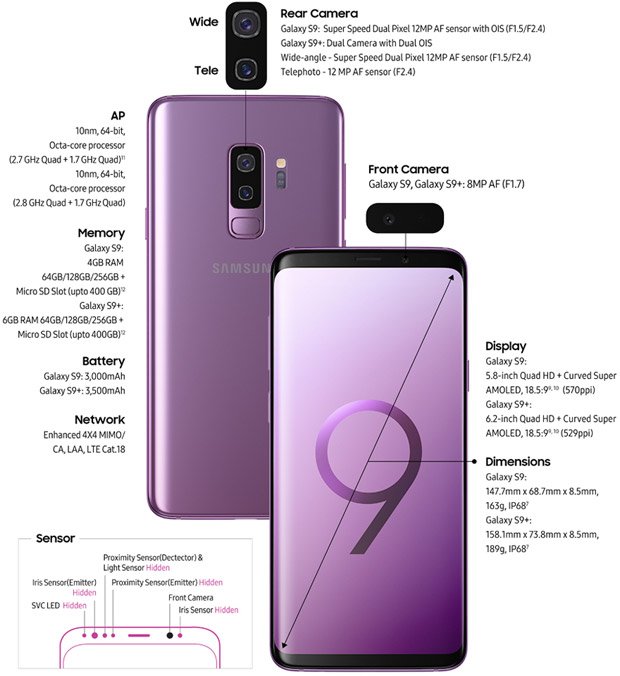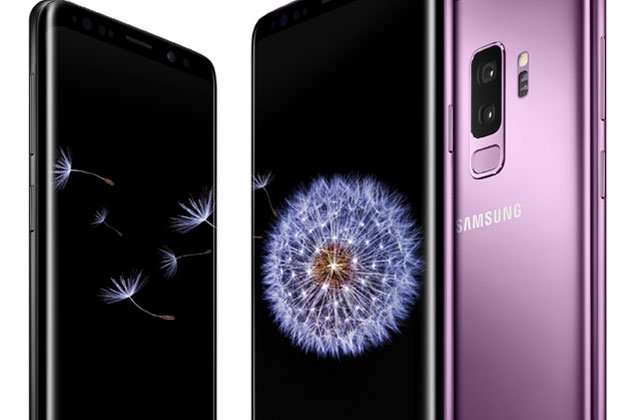[ad_1]
Samsung on Sunday raised the curtain on the latest models of its flagship Galaxy smartphones, the S9 and S9+, featuring improved imaging and audio performance.
Two standout features in the 12-megapixel rear-facing camera are improved low light performance and super slow-mo video.
By adding dual aperture capabilities to the camera (f1.5/f2.4), Samsung has boosted the unit’s performance in challenging lighting conditions, allowing more light through the lens when conditions are dark and less in bright light.
Samsung also made improvements in the processing of low light photos.
“They’ve improved the noise reduction, which is important in a low light photograph,” said Ross Rubin, principal analyst at Reticle Research.
“Very often, when you take a picture in low light, you’ll see a lot of graininess,” he told TechNewsWorld. “Samsung has taken advantage of the latest advances in processors, both theirs and Qualcomm’s.”
In North America, the S9 models are built around Qualcomm’s Snapdragon 845 processor.

Galaxy S9 and S9+ Specs
Super Slow-Mo
The camera also can capture video at super slow-mo speeds of 960 frames a second, which can drag out two-tenths of second of live action into six seconds of slow motion video.
“It’s something that people are going to want to use sparingly to highlight a particular point of interest,” Rubin said.
“Super slow-mo is very cool if you’re into that, but not everybody is,” Technalysis Research Chief Analyst Bob O’Donnell told TechNewsWorld.
The cameras made an overall favorable impression on Patrick Moorhead, principal analyst at Moor Insights and Strategy.
“The S9 and S9+ cameras look incredible, especially the S9+,” he told TechNewsWorld.
“They’re a melting pot of all the desired features users will find important, plus a few features, like Super Slow-mo, that people will want,” Moorhead said. “While I need to test the S9+, it very well could be the best camera available.”
AR Emoji and 360 Sound
The new Galaxy models support the creation of augmented reality emoji. The feature can analyze a two-dimensional image of a user and map out more than 100 facial features to create a three-dimensional model that reflects and imitates expressions, like winks and nods.
The AR emojis can be shared through video, as well as stickers and AGIF files, which are compatible with most third-party messaging platforms.
However, Samsung may need to work out some kinks in the feature.
“It doesn’t work that well,” Technalysis’s O’Donnell said. “In my case, the emoji didn’t look like me.”
Samsung has beefed up the sound systems in the new S9s. The phones have stereo speakers tuned by AKG, and they support Dolby Atmos, creating a 360-degree sound effect.
The S9 models are about 40 percent louder than their S8 predecessors, Moorhead noted.
“If they do Dolby Atmos well,” said O’Donnell, “it could be a real game changer for some people. It’s a real nice feature and capability.”
New Smart Home App
With the S9s, Samsung has introduced SmartThings, a new connected home app.
The app can serve as a central hub to control both Samsung and other brands’ connected devices at home, in the office or on the go, the company said.
“Samsung is trying to solve one of the biggest issues in home automation, and that is having too many apps that don’t work together,” Moorhead explained.
“SmartThings pulls together hundreds of home automation devices, most non-Samsung, with one app to manage them and have them work together,” he said.
“Conceptually, it looks great, but the devil is in the details of what it can actually talk to and what it can’t,” observed O’Donnell.
Samsung also introduced a new docking station with the Galaxy models. The Dex Pad allows the smartphones to connect to a monitor, keyboard and mouse.
“The new DeX Pad gives Samsung an enterprise competitive edge for sure,” Moorhead said. “No other company has this kind of docking sophistication that turns the phone into a PC.”
No Rush to Upgrade
Will the new features in the S9 models spur an upgrade rush among Samsung owners?
“It will be a tough sell for Galaxy S8 owners. The S8 already has strong imaging capabilities,” Reticle’s Rubin observed.
“It’s really about providing some extra incentive for people with older handsets to upgrade now,” he said.
The improvements in the phones are well executed but incremental, according to O’Donnell.
“The phone market has become one of incremental changes for everybody,” he said. “It’s getting harder and harder to make a significant distinction, which is why people are holding on to their phones longer, and why the market is starting to decline.”
The 5.8-inch S9 and 6.2-inch S9+ have super AMOLED displays with resolutions of 2960 x 1440 pixels, and they include 64 GB of memory. Pricing varies from carrier to carrier, with the S9 costing about US$800 and the S9+ around $920, although trade-ins can knock off as much as $350 from those prices.
The Galaxy S9 and S9+ will be available starting March 16 in select markets and will be offered in Midnight Black, Titanium Gray, Coral Blue and the new Lilac Purple.
[ad_2]
Source link
